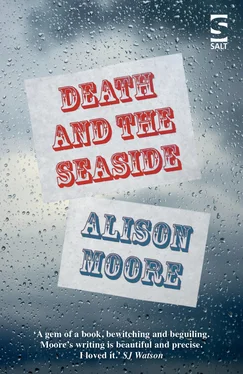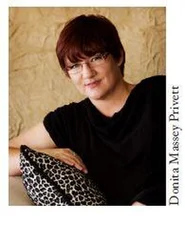‘Put what under your door?’ asked Sylvia.
‘It’s some kind of note, I think,’ said Bonnie. She looked again at the piece of paper in her hand, and almost thought that she might be able to make out a message after all, but even as she looked, that hint of words dissolved, as a mirage dissolves.
Bonnie left the piece of paper on the desk near the door, and Sylvia walked her back over to her bed.
‘I need to go to the toilet,’ said Bonnie.
‘There’s a toilet just there,’ said Sylvia, indicating one of the doors that Bonnie had taken for a cupboard.
‘I wasn’t expecting an en suite,’ said Bonnie.
‘You have everything you need right here,’ said Sylvia. ‘You don’t have to leave your room for anything. I’ll look after you.’ Sylvia held out her arm, and Bonnie, in her nightie, took it. She crossed the room, walking the length of that complicated carpet, with her arm linked through Sylvia’s, as if this were her wedding day, as if Sylvia were giving her away.
‘Here we are,’ said Sylvia, when they reached the door.
Bonnie went in to use the toilet. There was no window in there so she switched on the light, and shut the door for privacy. ‘There’s even a shower in here,’ she said to Sylvia, through the closed door. ‘I could do with a shower, a bit later maybe. What happened last night?’ she asked. ‘It’s like one minute we were sitting downstairs and the next minute I was waking up here.’ She pressed the flush but nothing happened. She tried again. ‘The flush isn’t working,’ she said, but Sylvia did not answer. Bonnie turned on the tap but no water came out. ‘I think there’s a problem with the water,’ she said. ‘We ought to let the landlady know.’
Bonnie opened the door and looked out, but Sylvia was not there. Bonnie made her way back across the room to her bed. She sat down. A tapping sound at the window made her turn her head: a seagull had perched on the sill outside and was rapping on the glass with its beak. The gull appeared to be looking at her, but Bonnie could not tell whether it could really see her or only its own reflection. It flew away.
Bonnie tried to remember whether she had phoned her mother after arriving in Seaton. Sylvia had gone to the bar to order food, and had come back to say that she had asked about using the phone, and that it would be fine to do so but that the line was out of order and was at that moment being fixed, and that she would be welcome to use it as soon as it was mended. Bonnie had not, as far as she could remember, made her call.
Sylvia came into the room with a tray, on which was a plate of toast and a cup of tea.
‘I want to phone my mum,’ said Bonnie.
‘Yes,’ said Sylvia, setting the tray down on Bonnie’s lap. ‘But we haven’t got a phone, have we? And we’re out of range here anyway.’
‘But the pub’s got a phone. I can use that.’
‘Yes,’ said Sylvia. ‘I’ll ask if it’s been fixed yet, and then if you’re strong enough I’ll take you downstairs so that you can phone your mother and tell her that you’re safe.’
Bonnie ate her buttered toast, and Sylvia said, ‘It’s not true, you know, that we swallow eight spiders a year in our sleep. It’s a complete fabrication, but the statistic is decades old and continues to circulate on the Internet. It goes to show how keen we are to believe what we see.’
‘I didn’t really think it was true,’ said Bonnie.
‘It’s probably more like one or two,’ said Sylvia. ‘By the way, when Joe asked Susan why he would be slipping notes under her door and sticking them onto her window, why did you star-out the word “fucking”?’
‘I couldn’t write that,’ said Bonnie. ‘My mum might read it.’
‘I don’t really see why you need the swearing at all,’ said Sylvia. ‘And you shouldn’t start a sentence with “and” or “but”. It’s bad form.’
Bonnie nodded and drank her tea. As she put her cup down again, she shivered.
‘Are you cold?’ asked Sylvia. ‘You didn’t bring a jumper with you, but I’ve got one you can wear.’ And she produced from somewhere, like a magic trick, or perhaps just out of a bedside drawer, a thin, blue jumper. She helped Bonnie to pull it on. ‘There,’ she said. She took the tray away, glancing back at Bonnie when she reached the door. Smiling, she left the room.
Bonnie looked at the clock on the wall and realised that the hands were not moving. It occurred to her that she had no idea what time of day it was. The meal — the toast and tea — could have been breakfast or supper. She wondered where her watch was: it was not on her wrist. She could not see her shoulder bag anywhere, but she knew that her mobile phone was not in it anyway. Not knowing what time it was, she could not even be sure what day it was. She would have to ask Sylvia.
She lay in bed, waiting to see whether it was going to get lighter or darker.
Eventually, with the window still framing a wide, blue sky, she fell asleep. The lack of curtains only troubled her when she woke in the night and saw the cold window with all that darkness outside, that big black rectangle in the middle of the long wall.
In her dream, Bonnie had jumped into a swimming pool. She was going down and down, feet first; the pool was impossibly deep, but it had no water in it. She felt her feet touch the white-tiled bottom, and remembered nothing after that.
Bonnie opened her eyes and lay looking at the uncurtained window, in the middle of which she could see a small, white square. She sat up, peering at it, trying to see what it was. It was clear that it was not a reflection of the Cézanne, the wrong apples, next to which a reflection of the broken clock would have hung like a moon.
There was no lamp on the bedside table, so she climbed out of bed and crossed the room in the dark. She reached out and touched the white square, a sheet of paper, which was stuck to the inside of the glass. On the page, she thought she could see, despite the darkness, the word ‘JUMP’. She unstuck the paper from the window, took it over to the desk and switched on the Anglepoise lamp, which spilt a pool of yellow light across the desktop. With the light on, she felt exposed to the outside world, which she could not see; if she looked at the window, she saw only her own reflection, as if she were standing in front of a one-way mirror in an investigation room.
Looking at the paper in the light, she found that there was nothing written on it after all, and even when she switched the lamp off again and looked at the page in darkness as before, she could see nothing there.
She went to the door of her room, but when she tried to open it she found it resistant, as if she were pulling when she ought to be pushing. Eventually, she realised that it was locked. Bonnie knocked on her door, from the inside. ‘Sylvia?’ she called. ‘Sylvia?’ But no one answered.
She turned away from the door and stood in the middle of the room, listening for sounds of breathing, hearing nothing. She scrunched up the piece of paper, dropped it into the wastepaper basket and went back to bed. She thought she might lie awake until it got light, but she must have fallen straight back to sleep because suddenly she was waking again. On the edge of sleep, she heard music, a song she knew — Last night as I lay on my pillow — the lines looping through her head — Last night as I lay on my bed — like the language she was supposed to be learning — Last night as I lay on my pillow — or like the lessons learnt by the children in Brave New World — I dreamt that my Bonnie was dead. What an odd song, she thought as she came awake, to hear in a pub in the depths of the night. Or perhaps it was only the remnant of a dream, because at that moment, the music stopped.
Читать дальше












